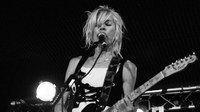Punk In Bristol
- https://archive.trinitybristol.org.uk/timelines/radicalism/punk-in-bristol
- Punk In Bristol
- 1981-09-29T00:00:00+01:00
- 1981-09-29T23:59:59+01:00
- Interview with feminist, performer and punk artist about creating work in the 1980's
- What radicalism
- When 29 Sep, 1981 (Europe/London / UTC100)
-
Add event to calendar
iCal
To some critics' punk in the UK lived and died in 1977. But arguably this is a London perspective. Punk took root in Bristol in the years following. Bands such as the X-Certs, & Disorder, were among the first in Bristol. Beyond the seeming aggression, punk was underpinned by a more fundamental DIY philosophy. Punk eschewed the high glamour of disco, with its aspirational lifestyles, fashion, and sensibilities. Big stadium orchestral rock had lost it’s relevance to young audiences in the darkening landscape of a troubled 1970s England.
Torn, ripped, studded, leather, mohawks, tartan and Doc Martens the punk aesthetic could not have been more different than the white shirts and shimmer dresses on city centre dance floors. But the impact of punk went much further. The can-do attitude and a finger up to pretension, led many young artists with no previous experience to pick up the guitar, drums, or take to the mic. Results varied but some Bristol artists stayed the course and became iconic musicians.
At its inception the rumbunctious energy of punk could have been directed to either the political right or left. Activists from both ends of the political spectrum were active in the movement but it was the left which one the day. Punk became a gateway to anarchist, Marxism, feminist and anti-racist perspectives.
As well as formal politics the anti-establishment inspired the squatting movement of the 1980s. The career of singer-songwriter Rita Lynch epitomises the importance of punk. The movement created a radical shift in her identity as an artist and as a woman.
Rita Lynch
In the 1960s, Rita Lynch was born and raised in a family of Irish immigrants in London. At age 10, she picked up the guitar for the first time and joined a folk band that performed at the local Catholic church. She relocated to Bristol in the 1980s, where there were punks, squats, and a vibrant inner-city Jamaican culture. She began creating songs, and her debut record, "Call me your Girlfriend," helped her gain national recognition. Since then, Rita has written and performed consistently and has a son who she uses her political nous to advocate for. Within this interview, she discusses her childhood, religion, political awareness, punk, her relationship with creating music and the role of the artist.

